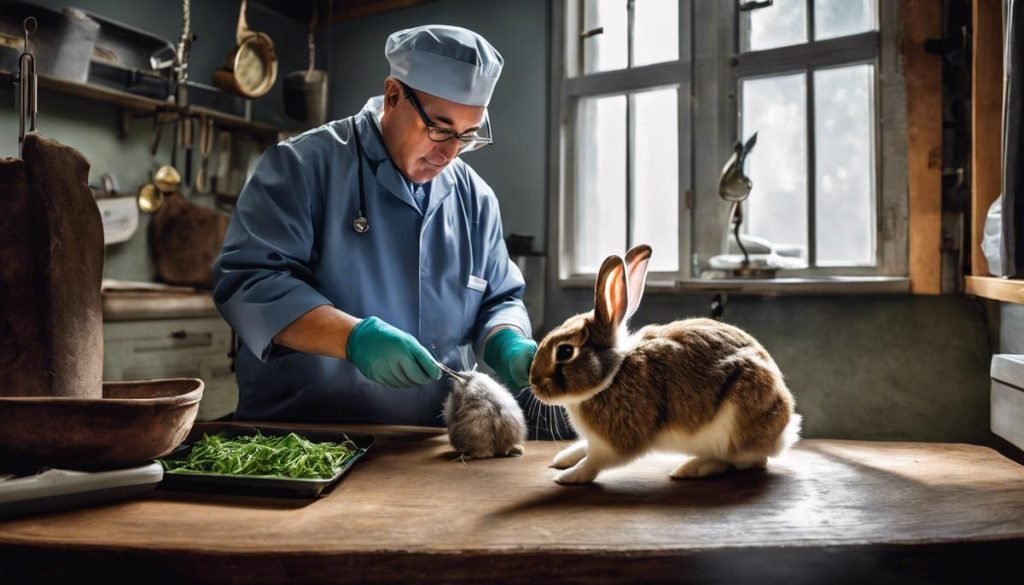When our furry companions, like rabbits, showcase a decrease in weight, it might spark concern amongst pet owners eager to ensure their animals are happy, healthy, and thriving. Weight loss in rabbits can be indicative of a range of health concerns or inadequate nutrition. Therefore, addressing this issue demands a concerted effort to recognize and resolve any underlying conditions, paired with meticulous dietary management. The journey toward restoring your rabbit’s optimum weight begins with comprehensive health evaluation and a strategic approach to feeding, tailored to bolster their caloric and nutritional intake without compromising their overall well-being.
Assessing Rabbit’s Health
The Skinny on Skinny Rabbits: Uncovering the Reasons Behind Underweight Bunnies
Maintaining a healthy weight is as crucial for our fluffy companions as it is for us. An underweight rabbit can be a cause for concern, signaling underlying health issues or care needs not being met. Understanding the reasons behind a rabbit’s unexpected weight loss can be the first step in nurturing them back to health.
Nutritional Imbalances
Just like humans, rabbits require a balanced diet consisting of hay, fresh vegetables, a small amount of pellets, and constant access to fresh water. A diet lacking in any of these key components can lead to weight loss. It’s essential to evaluate their daily food intake, ensuring it contains the right balance of nutrients needed for a rabbit’s well-being.
Dental Woes
Rabbits’ teeth grow continuously, and dental issues can arise if they’re not worn down properly. If a rabbit struggles to eat because of a tooth problem, marked by drooling or difficulty chewing, it’s time to consult a vet. Regular dental check-ups are crucial to prevent these problems and ensure your rabbit maintains a healthy appetite.
Parasites and Infections
Internal parasites, such as worms or protozoan infections, can interfere with nutrient absorption, leaving a rabbit malnourished and underweight. Parasites are persistent freeloaders, so a vet visit for diagnosis and treatment is non-negotiable if you suspect your rabbit may be hosting unwanted guests.
Psychological Stress
Rabbits are sensitive creatures; abrupt changes in their environment or routine can lead to stress. This emotional turmoil can result in a decreased desire to eat, leading to weight loss. Creating a stable, calm environment for your rabbit is key to their mental and physical health.
Age and Metabolism
Just as aging affects how people process food, older rabbits may experience metabolic changes, too. They might need a modified diet that’s easier to digest or higher in calories to maintain an ideal weight. Paying attention to the dietary needs of aging rabbits is pivotal in supporting their health throughout their golden years.
Illness
Various illnesses, from digestive conditions like GI stasis to systemic diseases such as cancer, can result in weight loss in rabbits. If dietary adjustments and environmental changes do not improve your rabbit’s condition, it’s time to consult the vet. Prompt diagnosis and treatment can make all the difference.
In Conclusion
Detecting and addressing the reasons behind a rabbit’s weight loss early can have a significant impact on their recovery and quality of life. By being vigilant and maintaining regular health checks with a professional, the cause of an underweight rabbit can often be identified and corrected. With the proper care and attention, your rabbit can bounce back to being the picture of bunny health.

Dietary Adjustments for Rabbits
Ensuring a Happy, Healthy Rabbit: Tips for Weight Gain
When considering how to assist your rabbit in gaining weight, it’s essential to approach the problem with a blend of knowledge and care. These gentle creatures require a balanced diet specifically tailored to their unique digestive systems. A rabbit underweight may need more than just extra food—it needs the right kind of nutrition to thrive.
Creating a Nutrient-Dense Diet for Your Rabbit
Rabbit owners often wonder what to feed their pets to encourage a healthy weight. The answer lies in offering a carefully selected diet that provides high energy and rich nourishment:
- Alfalfa Hay: Unlike timothy hay—recommended for the average adult rabbit—alfalfa hay is higher in calories and calcium, which can be beneficial for underweight rabbits. This should be given alongside a variety of other hays to prevent excessive weight gain once the ideal weight is achieved.
- Quality Pellets: Look for pellets that are high in fiber yet devised to deliver more calories and nutrients. While not all pellets are created equally, choose those with a solid nutritional profile, tailored to support weight gain.
- Oats: A small portion of oats can be a welcome addition to an underweight rabbit’s diet. These grains are high in calories and can help in putting on weight. However, remember to introduce any new food gradually to prevent digestive upsets.
- Fresh Vegetables: Leafy greens and root vegetables can provide additional nutrition and are generally well-loved by rabbits. Serve a daily diversity of veggies to ensure a well-rounded intake of vitamins and minerals.
- Treats and Supplements: In moderation, treats like bananas, apples, or carrots can be given as a supplemental snack. They should never constitute the main part of the diet but can encourage eating and weight gain when used judiciously.
Adjusting the Feeding Routine
An underweight rabbit may benefit from more frequent feeding times. Breaking down their meals into smaller, more manageable portions throughout the day can encourage them to eat more consistently, aiding steady weight gain.
Monitoring and Adjusting the Diet
As you implement these dietary changes, careful observation is key. Monitor your rabbit’s weight regularly and adjust food intake accordingly. Remember, the goal is a gradual return to a healthy weight. Rapid weight gain can be just as harmful as being underweight, so be sure to proceed with caution and patience.
Consulting with a veterinarian familiar with rabbits is always a wise choice to ensure the diet is suitable and to clarify any potential underlying health issues that may be influencing your rabbit’s weight.
Continuous Attention Leads to Continuous Health
A well-fed rabbit is a sight to behold: active, alert, and vibrant. By providing a diet rich in the right nutrients, in the correct amounts, and at the right times, you can nurture your rabbit back to an optimal weight. Always be in tune with your rabbit’s needs and adjust as necessary. In time, with love and attention to detail, your furry companion will flourish.

Monitoring Rabbit’s Weight Gain
Maximizing Rabbit Weight Management: A Handy Guide to Tracking Progress
Monitoring a rabbit’s weight is crucial in ensuring their health and well-being. Maintaining an ideal weight for rabbits is not only about diet but also about tracking their progress effectively. By keeping tabs on weight changes, one can quickly address any issues that may arise, ensuring the bunny stays fit and in high spirits.
Regular Weigh-Ins: The Cornerstone of Weight Management
Setting a regular weighing schedule is fundamental. Once a week should suffice for most rabbits, but those with weight concerns may need more frequent monitoring. Use a digital scale for accuracy, placing it in a quiet area to keep your bunny calm during weigh-ins.
Create a Weight Log
Establishing a record-keeping system is vital. A simple notebook or a digital spreadsheet can serve as an effective weight log. Document the date, time, and weight at every check-in. This record will reveal trends over time, enabling preemptive action if your rabbit’s weight starts to drift from its normal range.
Understanding Weight Fluctuations
Expect natural fluctuations; a variation of a few grams is normal. Factors such as meal times and bowel movements can account for these changes. However, substantial and consistent weight loss or gain should not go ignored.
Comparing with Breed Standards
Familiarize yourself with the healthy weight range for your rabbit’s breed. These standards can be found online or provided by your veterinarian. Use them as a benchmark for what is considered healthy for your specific furry friend.
Assessing Body Condition
Alongside weighing, perform a regular body condition check. Feel the rabbit’s spine and ribs; if bones are prominent without a slight fat covering, it could indicate underweight issues. Conversely, if it’s difficult to feel the bones due to excess fat, your rabbit may be overweight.
Incorporating Environmental Enrichment
Exercise is as crucial as diet. Ensure your rabbit has ample opportunity for physical activity. An enriched environment with space to hop, toys to play with, and tunnels to explore fosters natural behavior and aids in keeping a robust constitution.
Seeking Veterinary Insight
Significant or sudden weight changes warrant a vet visit. Health issues could be at the root, and only a professional can diagnose and recommend appropriate actions or dietary adjustments.
Incorporating weight tracking into the care routine is straightforward and immensely beneficial. With consistency and attention to detail, any rabbit owner can become proficient in overseeing their companion’s weight. Your diligence in tracking will pay off in your rabbit’s sustained health and vibrancy, letting them hop into a happy and healthy future.

Steering your rabbit back to a robust weight is a testimony to your dedication to their health and happiness. With a discerning eye on their dietary habits, regular weigh-ins, and a steady adherence to high-quality, nourishing foods, your rabbit can achieve a balanced and healthy weight. As you continue to foster an environment enriched by proper nutrition and care, your attentive efforts will no doubt culminate in the flourishing of your companion’s vitality and zest for life. Remember, the path to weight gain is a delicate balance, one that requires patience and adaptability, but with unwavering commitment, the rewards of a thriving rabbit are invaluable.



